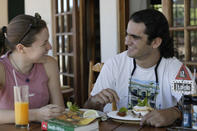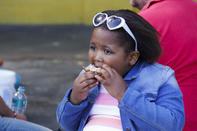Basic Math, Culture and Emotions
One of the obvious reasons for getting so heavy is right there in the basic maths: we are putting more fuel in the tank than we are burning up on the drive. If your body needs 2 100 calories to get through a day, and you put 2 300 in, you are going to have 200 calories spare which have to go somewhere and your body will store it away for one of those days when you need, say, 2 500 calories but you only give it 1 900.

Technically, it doesn't really matter if those calories come from several rounds of low-fat dressing, fat-free green salad with rye bread, or back-to-back chocolate éclairs. The total energy in versus the total energy out is the bottom line in determining whether you accumulate fat or not. How well the engine runs on that fuel is another matter.
But beyond the simple sums, the reasons underlying the obesity pandemic that is sweeping through our species globally are complex and varied. We are gaining weight for reasons that are related to rising national wealth; the geography of our cities; government policy; the industrialisation of our food system where highly processed foods last longer on the shelves, are cheaper to produce and hit all our physiological sweet spots.
Cultural norms on food and weight also come into play, as does our genetic hard-wiring and a predisposition to our various body shapes. Our emotional well-being is linked with the foods we choose to eat; we have a predisposition to be sedentary. And then there is the basic human drive to feel full. It is fuelling a global epidemic and a lot of it has to do with our move into the cities.
Another reason for why we are getting fat is, quite simply, we like food. We need to. We evolved to crave it. If we had not, we would have been booted out of the gene pool long ago.
Conditions in the Modern World
Another reason we love to eat – and overeat – is to rub the sharper edges off the sometimes painful aspects of the human condition. A slab of chocolate or an extra helping of macaroni cheese can have a powerful effect on that burr-in-the-sock discomfort of loneliness, heartache, frustration, anger, irritability or longing. Extra weight may be a defensive mechanism.
When a child is abused or bullied, they are usually small, and easy target to a large, threatening abuser. That child might grow up to pad herself with fat. For some, it may be a way of keeping unwanted affections at bay. For others, it is a way of puffing oneself up, becoming the opposite of what the abused child was: it is about being large and threatening in an intimidating world.
The way modern living disrupts our sleep patterns might also be partly to blame. Too much stimulation keeps us up long after our bedtime: caffeine and sugar; electronic lighting and TV short-circuit the brain’s natural shutdown after sunset; unrelenting work schedules such as night duty and ten-hour work shifts; long journeys in rush-hour traffic. Late nights and disrupted sleep patterns also contribute to us packing on the pounds.
Bigger is Better and More Prestigious

Just as Starbucks has added to its menu a cup of take-away coffee nearly one litre in volume – the Trenta size – a theory has emerged to explain why our eyes are so much bigger than our stomachs. Why, when we are given the option to take more than we need, do we do so, even when we know we cannot or should not eat it all?
It is almost ubiquitous in the United States, and will surely spill over here as so many multinationals spread their franchises out across the subcontinent, supersizing just about anything fast food: coffee, cola, burgers and chips, two-for-the-price-of-one pies, you name it. The argument is that we serve ourselves extra-large portions as a display of social status, of hierarchy.
‘This isn’t such a strange conjecture,’ writes Jonah Lehrer in the online magazine Wired. ‘Think, for instance, of the alpha males in those David Attenborough specials on television – the most powerful animal is the one who eats the most, getting access to the felled antelope before anyone else. Or think of all the cultural norms that associate larger products with increased status, from the screen size of televisions to the square footage of houses.
In category after category, bigger isn’t just better – it’s also far more prestigious, a signal that we can afford to splurge on spare rooms we’ll never use.’ The only problem, as Lehrer points out, is that this supersizing is also our social undoing. ‘It appears that one of the factors causing us to consume too much food is a lack of social status, as we try to elevate ourselves by supersizing meals.
Unfortunately, this only leads to rampant weight gain which, as researchers note, “jeopardizes future rank through the accompanying stigma of being overweight.” In other words, it’s a sad feedback loop of obesity, a downward spiral of bigger serving sizes that diminish the very status we’re trying to increase.’
Obesity and Social Status
While it may be true in many Western contexts that obesity diminishes status, there are plenty of cultural spaces where bigger is seen as better. Consider the field notes from a group of community health workers in Khayelitsha, Cape Town, by a non-governmental healthcare organisation, Zanempilo, early in the 2000s.
The organisation was trying to gauge what the feeling was in this neighbourhood regarding food, eating habits, cooking practices and perceptions about certain foods.
The health workers they questioned mostly said they viewed moderately overweight women as attractive, associating this with ‘dignity, respect and confidence’, even though they did admit that being heavy usually came with ‘continuous body aches and tiredness’. Of the women who were measured up as part of the study, ‘two were normal weight, two were overweight, 25 obese and 15 extremely obese’.
When they were asked why they were not able to lose weight, they said that a lack of exercise and concerns about the risk to their personal safety if they did exercise in their communities were key. But they also feared what the community would think of them, should they lose weight. ‘I am scared of exercising,’ one woman admitted during an interview, ‘because I will lose weight and people may think that I have HIV/AIDS.’
By Leonie Joubert